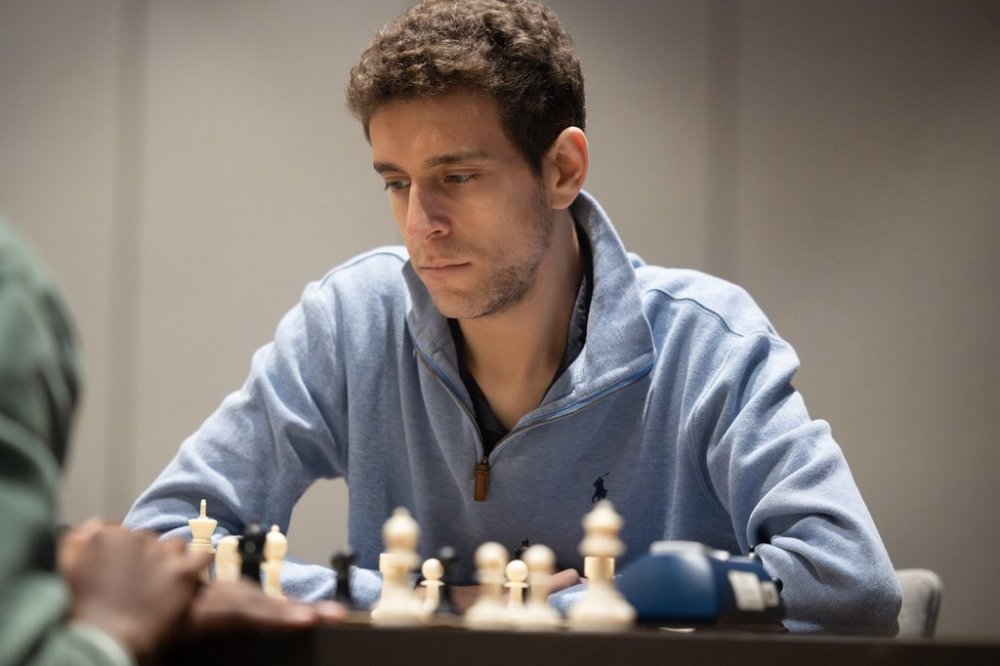American chess grandmaster Daniel Naroditsky dies at 29
Advertisement
Read this article for free:
or
Already have an account? Log in here »
To continue reading, please subscribe:
Monthly Digital Subscription
$1 per week for 24 weeks*
- Enjoy unlimited reading on winnipegfreepress.com
- Read the E-Edition, our digital replica newspaper
- Access News Break, our award-winning app
- Play interactive puzzles
*Billed as $4.00 plus GST every four weeks. After 24 weeks, price increases to the regular rate of $19.95 plus GST every four weeks. Offer available to new and qualified returning subscribers only. Cancel any time.
Monthly Digital Subscription
$4.99/week*
- Enjoy unlimited reading on winnipegfreepress.com
- Read the E-Edition, our digital replica newspaper
- Access News Break, our award-winning app
- Play interactive puzzles
*Billed as $19.95 plus GST every four weeks. Cancel any time.
To continue reading, please subscribe:
Add Free Press access to your Brandon Sun subscription for only an additional
$1 for the first 4 weeks*
*Your next subscription payment will increase by $1.00 and you will be charged $16.99 plus GST for four weeks. After four weeks, your payment will increase to $23.99 plus GST every four weeks.
Read unlimited articles for free today:
or
Already have an account? Log in here »
Daniel Naroditsky, a chess grandmaster who started as a child prodigy and quickly became one of the most influential American voices in the sport, died Monday. He was 29.
The Charlotte Chess Center in North Carolina, where Naroditsky trained and worked as a coach, announced his death on social media, calling him “a talented chess player, educator, and beloved member of the chess community.”
“Let us remember Daniel for his passion and love for the game of chess, and for the joy and inspiration he brought to us all every day,” his family said in a statement shared by the center.

The cause of death was not immediately known.
Naroditsky became a grandmaster, the highest title in chess aside from World Chess Champion, at the age of 18.
Years earlier, the California-born player won the Under 12 world championship and spent his teenage years writing chess strategy books as he climbed the world rankings.
He was consistently ranked in the top 200 worldwide for traditional chess and also excelled at a fast-paced style called blitz chess, maintaining a top 25 ranking throughout his adult career. Most recently Naroditsky, known to many as Danya, won the U.S. National Blitz Championship in August.
Fellow grandmasters credited Naroditsky with introducing the sport to a wider audience by livestreaming many of his matches and sharing live commentary on others. Thousands of people regularly tuned in on YouTube and the interactive streaming platform Twitch to watch Naroditsky play.
“He loved streaming, and he loved trying to be educational. The chess world is very grateful,” Hikaru Nakamura, an American grandmaster, said on a livestream Monday.
In a final video posted to his YouTube channel on Friday titled “You Thought I Was Gone!?” Naroditsky tells viewers he’s “back, better than ever” after taking a creative break from streaming. He talks viewers through his moves as he plays live chess matches on the computer from a cozy home studio.
Other elite chess players from around the globe took to social media to express their shock and sadness.
Dutch chess grandmaster Benjamin Bok reflected on his lifelong friendship with Naroditsky, who he said he’s known since the Under 12 world championship that Naroditsky won in 2007.
“I still can’t believe it and don’t want to believe it,” Bok said on X. “It was always a privilege to play, train, and commentate with Danya, but above all, to call him my friend.”
Naroditsky was the son of Jewish immigrants to the U.S. from Ukraine and Azerbaijan. He was born and raised in San Mateo County, California, and was described by his parents as a very serious kid with an impressive attention span and memory. He went on to study history at Stanford University, earning a bachelor’s degree in 2019 after taking a year off to play in chess tournaments.
After college, he moved to Charlotte, North Carolina, where he coached the area’s top junior chess players.
___
This story has been corrected to show that it is the Charlotte Chess Center, not the Charlotte Chess Club.

